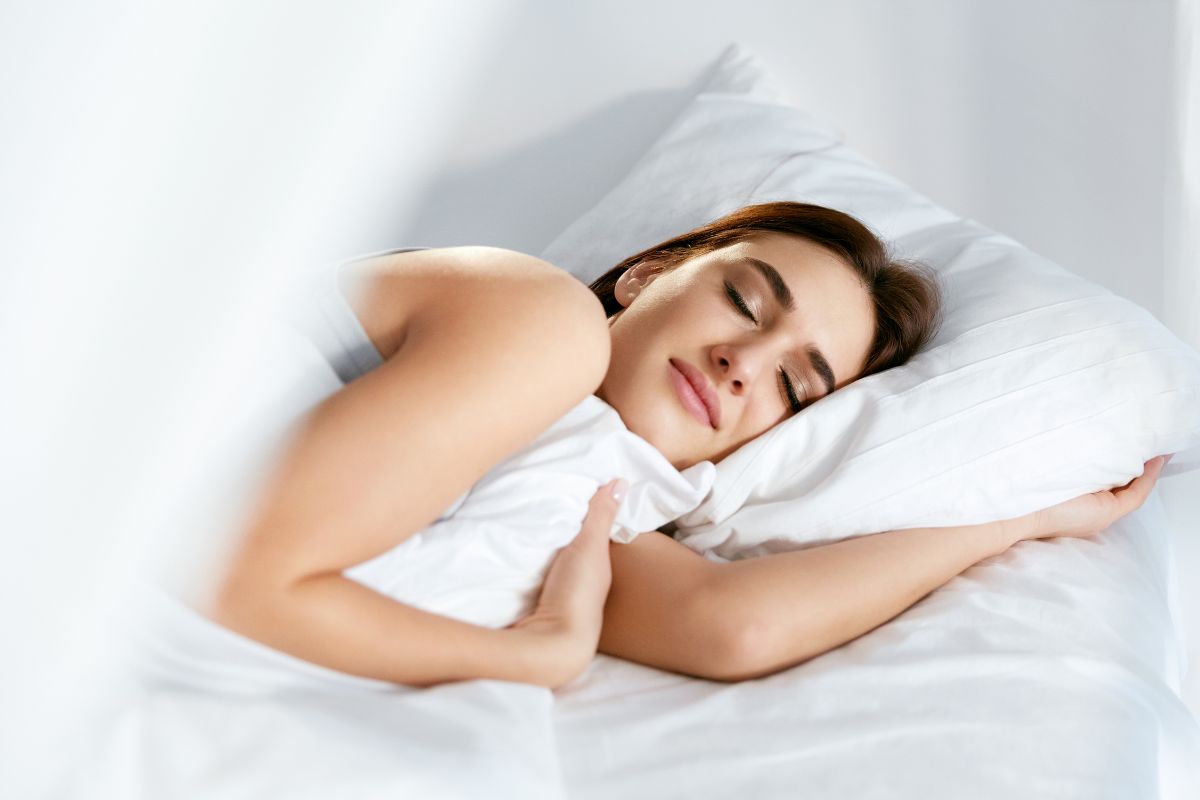Natural Lifestyle Remedies for Better Sleep

Quality sleep is vital for physical health, mental well-being, and daily performance. Getting enough restorative sleep helps regulate mood, memory, metabolism, and immune function. Yet many adults struggle: CDC data show about 15% of U.S. adults frequently have trouble falling asleep, and over one-quarter sleep under the recommended 7 hours per night. Poor sleep is linked to daytime fatigue, reduced concentration, and higher risks of chronic illness. These challenges often stem from factors like stress, irregular routines, and environmental disruptions. Fortunately, research and expert guidelines highlight many natural, lifestyle-based strategies to improve sleep quality without medication. By adopting consistent habits, mindful eating and supplement choices, a sleep-friendly environment, and relaxation techniques, most people can enhance sleep naturally and holistically.
Daily Habits That Support Healthy Sleep
-
Keep a consistent sleep–wake schedule. Going to bed and waking up at the same time every day helps anchor your circadian rhythm. Experts note that a regular wake-up time (even on weekends) “leads to regular times of sleep onset,” aligning the internal clock. In turn, a well-regulated circadian clock promotes easier sleep and more refreshing rest.
-
Get morning sunlight. Bright light early in the day is a powerful cue to reset the body’s internal clock. Exposure to natural sunlight soon after waking boosts daytime cortisol and alertness, and has been linked to better sleep quality and mood. Even a brief walk outside or bright outdoor exposure in the morning can help your body recognize daytime vs. nighttime.
-
Exercise regularly. Daily physical activity (ideally earlier in the day) is strongly associated with improved sleep. A review notes that moderate-to-vigorous exercise “can increase sleep quality,” shortening the time it takes to fall asleep and reducing nighttime awakenings. In contrast, sedentary days often lead to lighter, more disrupted sleep. Aim for at least 150 minutes of moderate exercise (brisk walking, cycling, etc.) spread through the week.
-
Limit naps and manage light exposure. Long naps late in the day can reduce nighttime sleep drive, so it’s best to nap early or keep naps short (15–30 minutes). Likewise, avoid bright artificial light (especially blue light from screens) in the evening. Harvard experts warn that evening light – particularly blue wavelengths – powerfully suppresses melatonin and shifts circadian rhythms. As such, turn off devices at least 1–2 hours before bed to let melatonin rise naturally.
Dietary Choices and Drinks for Better Sleep
-
Avoid caffeine late in the day. Caffeine (coffee, tea, energy drinks, soda) blocks the brain chemical adenosine and delays sleepiness. Studies show that caffeine consumed even 6–8 hours before bedtime can significantly disrupt sleep, making it harder to fall asleep and reducing total sleep time. Experts recommend cutting off caffeine by mid-afternoon (at least 6–8 hours before bed) to avoid interference with sleep.
-
Limit alcohol and heavy meals at night. While alcohol may make you feel drowsy, it fragments sleep later in the night. Research finds that drinking in the evening leads to more awakenings and overall poorer sleep quality. Sleep specialists advise avoiding alcohol within a few hours of bedtime – typically at least 3 hours before bed. Similarly, large or spicy dinners close to bedtime can cause indigestion and disrupt sleep. The CDC also recommends avoiding large meals within a couple hours of sleep to help prevent nighttime awakenings.
-
Hydrate and eat light snacks wisely. It’s fine to have a light, sleep-friendly snack if hungry, but avoid overeating late. Some people find warm milk (contains tryptophan) or small portions of complex-carbohydrate snacks (like whole-grain crackers) can be soothing. Foods naturally containing melatonin or tryptophan – such as tart cherries, kiwis, or bananas – may also support sleep onset. For example, studies of tart cherry juice show it increases blood melatonin levels and improves sleep duration. Consuming a glass of unsweetened tart cherry juice about an hour before bed has been associated with longer and better-quality sleep in some trials.
-
Choose herbal and nutrient-rich beverages. Caffeine-free herbal teas can be a relaxing bedtime ritual. Teas such as chamomile, lemon balm, or passionflower are traditionally used as mild sedatives. Clinical studies suggest chamomile extract modestly improves sleep quality, and lemon balm tea can reduce stress-related insomnia symptoms. If using herbal teas, drink them warm and roughly an hour before bedtime. Also, consider beverages containing sleep-supporting nutrients: for instance, a cup of kefir or tart cherry juice (as above) provides melatonin and tryptophan naturally.
-
Include magnesium-rich foods. Magnesium is a mineral that relaxes muscles and regulates neurotransmitters involved in sleep. Diets low in magnesium have been linked to poorer sleep. Good dietary sources include nuts (almonds, cashews), seeds (pumpkin, sunflower), leafy greens (spinach, kale), whole grains, legumes, and dairy. Ensuring adequate magnesium intake from foods may help improve sleep duration and ease in falling asleep. (If diet is insufficient, magnesium supplementation can be considered – see supplements below.)
Natural Supplements and Herbal Remedies
-
Melatonin. Melatonin is a hormone your brain secretes at night to signal sleep. Taken as an over-the-counter supplement in small doses (typically 1–5 mg about 30 minutes before bedtime), it can help some people fall asleep faster. Melatonin supplements are especially helpful for circadian rhythm issues – for example, delayed sleep phase (night owls) or jet lag. Experts caution that melatonin is not a cure-all: it primarily aids sleep onset and should be used short-term or under guidance. Always start with a low dose (e.g. 1 mg) and consult a doctor if considering long-term use.
-
Valerian root. Valerian is a traditional herbal sleep aid. Several clinical trials have found that valerian root extract can shorten sleep latency and improve sleep quality without causing daytime drowsiness. For example, one study reported most participants fell asleep faster after taking valerian tea, and another found improved sleep quality with valerian extract. However, systematic reviews note that the overall evidence is mixed and often not dramatic. If you try valerian, look for standardized extracts (often 300–600 mg), and avoid combining it with other sedatives.
-
Chamomile. Chamomile is a gentle herb commonly consumed as tea. It contains apigenin, a flavonoid that binds to brain receptors to produce a mild tranquilizing effect. Some clinical trials report that chamomile supplements or tea modestly improve sleep quality and reduce insomnia symptoms. In one study of new mothers, regular chamomile tea drinkers reported better sleep and lower depression levels than a control group. Chamomile is very safe and can be used nightly as a calming bedtime beverage or in supplement form (typically 200–400 mg extract).
-
Magnesium. As noted above, magnesium supports the body’s relaxation systems. Expert advice suggests magnesium supplements (250–500 mg) at bedtime can help anxious or “busy” minds quiet down by shifting neurotransmitter balance toward relaxation. Magnesium also aids melatonin production and may relieve restless legs or muscle cramps that interrupt sleep. Both Mayo Clinic and sleep specialists recommend trying a well-absorbed form (e.g. magnesium citrate or glycinate) at doses up to ~350 mg nightly. Those with kidney issues should consult a doctor first.
-
Other herbs. Several other botanicals have mild sedative properties. For example, passionflower and lemon balm teas can reduce anxiety and help induce sleepines. Lavender (taken as tea or aromatherapy) is another popular remedy for calm. While individual results vary, these herbal preparations are generally safe for short-term use. Be sure to use reputable brands and check for possible interactions if you take medications.
Sleep Hygiene and Bedroom Environment
-
Optimize lighting. Keep your sleep space as dark as possible. Even dim room light or streetlights can suppress melatonin. Use blackout curtains, eye masks, or dim red night-lights if needed. Eliminate bright screens in the bedroom and avoid phone or tablet use in bed. (Blue-light–blocking glasses or apps that filter blue light can help if you must use electronics in the evening.)
-
Reduce noise and distractions. A quiet bedroom promotes uninterrupted sleep. If noise is unavoidable (e.g. traffic), consider earplugs or a white-noise machine. Make your bedroom a tech-free zone: remove TVs, computers, and even work materials. Use your bed only for sleep or intimacy – this conditions your brain to associate the bedroom with rest.
-
Keep a cool, comfortable temperature. A bedroom around 65–68°F (18–20°C) is ideal for most adults. A cool room helps your core body temperature drop naturally at night, which is an important cue for sleep onset. If you sleep hot, use fans, lighter bedding, or air conditioning. Comfortable bedding and pillows (suited to your sleeping position) further ensure you stay asleep without tossing or adjusting.
-
Establish a pre-sleep routine. Engage in relaxing activities before bed to signal to your brain that it’s time to wind down. This could include reading a non-stimulating book, gentle stretches, or listening to calm music. Aim to start your routine 30–60 minutes before bed: dim the lights, avoid screens, and do something soothing. Consistency is key – over time these cues will help your body prepare for sleep.
Stress-Reduction Practices
Mind-body techniques can greatly ease the transition to sleep. Mindfulness meditation, for example, teaches calm, present-moment awareness and has been shown to significantly reduce insomnia symptoms. A randomized study found that participants practicing mindful meditation experienced less insomnia, fatigue, and depression than those receiving sleep education. Likewise, relaxation exercises such as deep diaphragmatic breathing trigger the body’s natural relaxation response. Breathing slowly (e.g. 4–7–8 technique or similar) activates the parasympathetic nervous system, lowering heart rate and stress hormones.
Another effective tactic is journaling. Cognitive research indicates that writing down your worries or next-day tasks can offload mental to-do lists and quiet the mind. In one study, people who wrote a detailed “to-do” list at bedtime fell asleep significantly faster than those who wrote about completed tasks. The act of writing helps reduce bedtime anxiety, facilitating quicker sleep onset. Finally, simple rituals like taking a warm bath or shower about 1–2 hours before bed can improve sleep latency by raising then cooling core body temperature, which naturally signals sleep time. In short, practices that relieve stress and signal relaxation – such as meditation, breathing exercises, journaling, and warm baths – can make it easier to fall asleep and stay asleep.
-
Mindfulness/Meditation. Practicing breathing-focused or guided mindfulness for even 10–20 minutes a day can reduce rumination and racing thoughts at night. Over time, this builds a reflex to enter relaxation mode when lying in bed.
-
Journaling/“Brain-dumping.” Spend 5–10 minutes before bed jotting down tomorrow’s tasks or worries. Research shows that writing a specific to-do list at night helped people fall asleep faster than reflecting on past events.
-
Relaxation exercises. Techniques like progressive muscle relaxation, yoga stretches, or guided imagery can ease physical tension. Even simple deep breathing (slow inhales/exhales) activates calming brain chemistry and lowers cortisol.
-
Bedtime routine. A consistent wind-down routine is important. This might include dimming lights, listening to soft music, or sipping a caffeine-free herbal tea. Avoid stimulating activities (like intense conversations or work) late at night. Over weeks, the routine itself becomes a powerful cue that it’s time to sleep.
Conclusion
Improving sleep naturally requires a holistic approach that combines healthy habits, smart nutrition, and a soothing environment. Good sleep hygiene – including a stable sleep schedule, cool/quiet dark bedroom, and screen avoidance – lays the foundation Supportive daily practices (regular exercise and morning light) and dietary choices (minimizing evening caffeine/alcohol, incorporating sleep-promoting foods) further reinforce healthy sleep. When needed, gentle remedies like melatonin, magnesium or calming herbal teas can give extra support.






